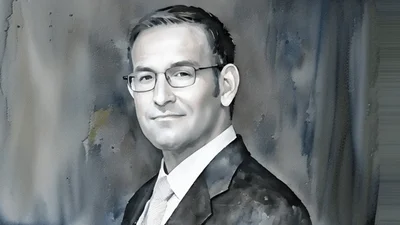Donald Kochan, Professor of Law at the Antonin Scalia Law School at George Mason University and Executive Director of the Law and Economics Center | https://www.law.gmu.edu/directory/profiles/kochan_donald
For some constitutional scholars, otherwise mundane polices relating to Native American lands, and lawsuits against oil companies for environmental damage, come down to a single, foundational principle: property rights. From zoning ordinances and land easements to retroactive lawsuits and regulatory encroachments, the stability of American society, law, and economic development may hinge on how the nation defines—and defends—the right to own.
With global investment, tribal sovereignty, and climate accountability on the line, Donald Kochan believes that weakening property rights weakens the entire democratic project. Kochan is Professor of Law at the Antonin Scalia Law School at George Mason University and Executive Director of the Law and Economics Center. He has published several books and over 50 scholarly articles that flow from his passion for property law.
“Property and property rights are really the grounding of all of our other rights,” Kochan says. He views property as essential to individual autonomy, asserting, “It’s about the ability to exclude others from your own self as well as from your physical things that you own.” The capacity to own and control resources, he explains, incentivizes investment and innovation. “Only if you can assert property rights in the improvements that you make... can you actually have an incentive to do those things in the first place.”
Kochan underscores that enforceable property rights are critical not only for economic growth but also for political stability. Referencing Hernando de Soto’s work, Kochan says, “The political system and political stability is dependent on a way in which individuals have control over their own resources so that the government can't come in at any point in time and disrupt that.” Without clear, enforceable rights, society risks devolving into chaos where neither individual progress nor loans and investment can thrive.
Kochan notes that the absence of property rights has stifled economic development. He points to the research of Terry Anderson and Thomas Stratmann, who highlight the historical presence of property rights among Native Americans and the correlation between stronger property rights and greater prosperity on reservations. “What's kept many of the reservations in poverty and has impeded economic development has been the absence of property rights,” he explains.
Discussing regulatory takings, Kochan notes a positive shift over the last 30 years, largely driven by public interest law firms like the Institute for Justice and the Pacific Legal Foundation. “They’re taking cases that no one could have afforded to bring before themselves,” he says, crediting the organizations with empowering individuals to push back against government overreach. Public awareness has also grown, notably around the controversial Kelo decision, where social media amplified public outrage. “It’s a constraint on how far…regulators can push the envelope,” he adds.
Kochan also questions the terminology around regulatory takings. His recent work suggests the term “involuntary regulatory servitude” better captures the nature of governmental imposition on property owners. “It calls it for what it is,” he says, “rather than some amorphous thing that allows the courts to somehow distinguish and say that a regulation is not actually affecting property rights if it's only diminishing value.”
Kochan points to a wave of lawsuits filed by parishes against oil companies for coastal land loss. The companies’ activities were lawful and even encouraged by the government during wartime efforts, but they now face retroactive liability. He cautions that retroactive lawsuits undermine trust in the rule of law, chilling future investments. “If you told people that they’re going to be on the hook for everything even though it’s been permitted, that kills prospective investment,” Kochan argues.
The problem is compounded when courts can’t conduct cost-benefit analyses, ignoring the economic uplift industries provided to these communities. “Litigation can't consider trade-offs,” Kochan says. Without weighing the economic benefits, he warns, these lawsuits jeopardize prosperity and due process protections fundamental to property rights.
Another threat Kochan identifies is third-party litigation funding. Increasingly, he says, lawsuits are financed by outside investors with little regard for the merits of a case. “It creates all these problems,” he says, including encouraging meritless lawsuits and potentially opening the door for foreign adversaries to destabilize American judicial systems. “A destabilization of our judiciary should be a prime target for any clever adversary,” he warns, advocating for greater transparency and disclosure in litigation funding practices.
Kochan’s work reminds us that property rights are not just legal abstractions but the bedrock of individual freedom, political stability, and economic progress.









